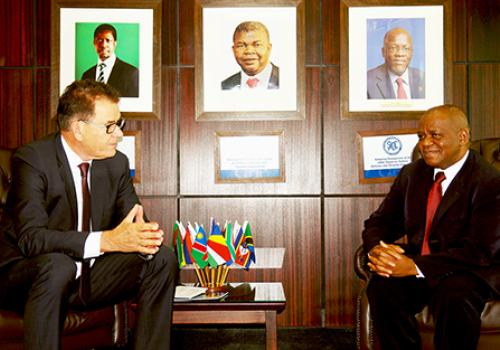Germany’s Federal Minister for Economic Cooperation and Development, Dr. Gerd Müller, who is on a tour of several African countries visited the Secretariat of the Southern African Development Community (SADC), in Gaborone, Botswana on 27 August 2018.
The Minister was welcomed to the Secretariat by the Deputy Executive Secretary for Regional Integration, Dr Thembinkosi Mhlongo on behalf of the SADC Executive Secretary, Her Excellence, Dr Stergomena Lawrence Tax.
During the brief visit, Dr. Müller discussed the Germany cooperation with SADC and the perspectives of the regional integration in Africa. The objective of the cooperation is to enhance the SADC’s capacity as the main coordinating body for regional integration in the Region.
Dr. Mhlongo briefed the Minister and his delegation on SADC’s overall programmes, with highlights on the long-standing bilateral cooperation between SADC and Germany. Since 1985, the Federal Ministry for Economic Cooperation and Development (BMZ) has provided a total volume exceeding €300 million in bilateral Technical and Financial Cooperation to the SADC Region.
Both Parties noted the success stories achieved to date in implementing SADC programmes. One such example is the support in the “Strengthening of National-Regional Linkages in SADC” (SNRL) Programme since 2016. Yet another set of examples of the SADC Success stories resulting from the funding from German are in the areas of transboundary cooperation in the water sector where the BMZ support through GIZ has facilitated the establishment of necessary institutional and organisational frameworks which have resulted in harmonised policies, strategies, guidelines and instruments for transboundary cooperation in the water sector.
Furthermore, success has also been recorded in the Transfrontier Conservation Areas (TFCAs) where support has been provided to the local, national and regional actors to improve implementation of SADC protocols and strategies for sustainable natural resource management in transfrontier conservation areas.
Both Parties also noted the challenges the SADC Region is facing and one outstanding area is in compliance by Member States to implementing SADC Protocols and programmes. The German Cooperation committed to provide some support towards dealing with this challenge.
The Minister commended the SADC Secretariat for fostering regional integration, industrialization, peace and security cooperation within the region and added that the region has a mammoth task to create jobs and opportunities for young people.
Dr. Müller further said that the SADC region should mobilize the private sector within the region to work closely with vocational training institutions to bridge the gap between the academia and the industries and thus facilitate creation of job opportunities for the youth. In addition, he expressed his wish to see SADC Member States increase their export flux to the EU Market, by making efficient use of the existing instruments such as those provided in the Economic Partnership Agreements (EPAs).
The SADC Deputy Executive Secretary for Regional Integration emphasized the effort that the region is currently undertaking by developing Regional Value Chains and preparing for the profiling of the agro processing sector with support from the German Government through the GIZ funded SADC Germany Programme on Regional Values Chains. “This will enable the SADC region to meet the international standards in terms of quality, and to increase SADC exports to the EU market”, he said. In the same vein, he stated that SADC is also at an advanced stage in terms of Free Trade Agreement, and is a party to the Continental Free Trade Area (CFTA) and the Tripartite (SADC-COMESA-EAC) Free Trade Area, which will surely foster trade across the region and globally.
In concluding the discussions, both sides reiterated their wishes to continued cooperation in the existing areas of collaboration. The current SADC support from BMZ are in the areas of:
- Regional Economic Integration (covering also Peace, Security and Good Governance)
- Transboundary Water Management
- Transboundary Natural Resource Management and Resilience to Climate Change
- Strengthening National-Regional Linkages
- Strengthening compliance mechanisms for enhanced regional integration

